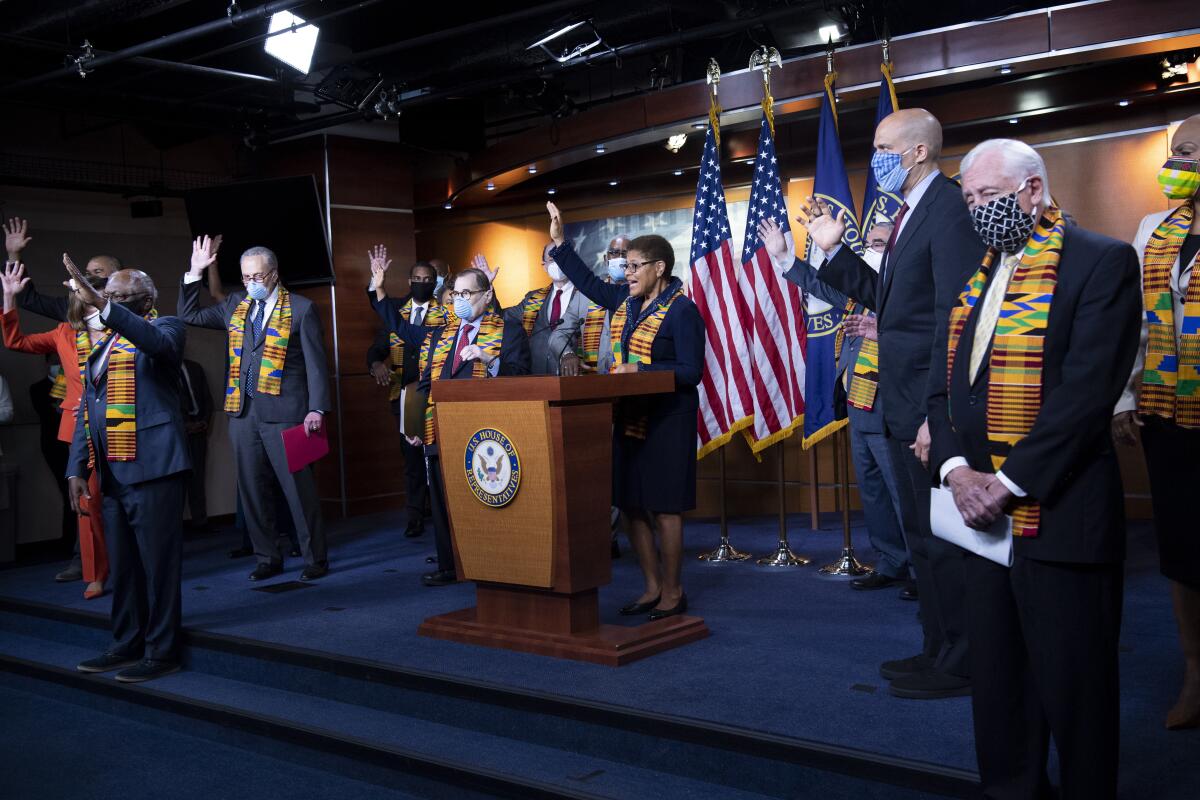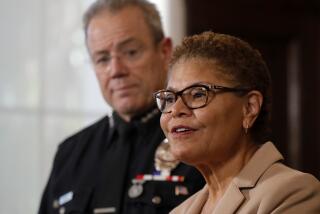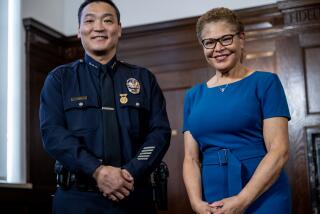She saw police reforms fizzle after Rodney King. Rep. Karen Bass doesn’t plan to let that happen again

Nearly 30 years ago, Karen Bass and other activists in South Los Angeles expected the beating of Rodney King – because it was videotaped — to spark a movement to reform policing.
In the wake of the latest act of police brutality caught on video, Bass — now a powerful Democrat in Washington — is hoping to use the national outcry to finally enact the federal policing reforms that failed to materialize after 1991.
House Speaker Nancy Pelosi (D-San Francisco) put Bass, chairwoman of the Congressional Black Caucus, in charge of the House’s response to the death of George Floyd at the hands of a Minneapolis police officer. On Monday, Bass introduced a bill that she’ll have to shepherd through the House and potentially through negotiations with congressional Republicans and the White House if it is to be signed into law.
It’s a formidable task, given the gridlock that has frozen legislation in the Democratic-led House, Republican-led Senate and unpredictable White House. And her message risks being co-opted by progressive Democrats, who have called to “defund” the police, and Republicans who are hoping to paint the Democratic effort as extreme.
Protests sparked by Floyd’s killing have given rise to a swelling, nationwide movement that cuts across virtually all aspects of American society. It’s a moment Bass is determined to capture.
“People see that this issue is not an issue that only affects, and should only be responded to, by Black people,” Bass, a fifth-term Democrat, said in an interview. “I am very encouraged that that really pushes the country to an inflection moment where maybe we can actually accomplish something significant.”
Republicans have not embraced Bass’ bill, but many have said they want to enact policing reforms. House and Senate Republicans plan to introduce their own bills as soon as this week.
The Democrats’ bill would make it easier for people to sue a police department if their civil rights are violated and for police to be prosecuted for criminal behavior. It would set up a national network to track police misconduct to prevent fired officers from getting rehired in a different jurisdiction, make lynching a federal hate crime and ban chokeholds and neckholds among federal officers.
Bass, 66, traces her interest in policing reforms to when she was a 19-year-old civil rights activist in South Los Angeles. She and other activists were harassed by Los Angeles police officers, she says, recounting vandalism to her car and multiple break-ins at her house. Bass said they infiltrated her protests to try to stir up violence and the chokehold was common.
“The police chief at the time said the reason Black people died from the chokehold was that we didn’t have the same veins in our neck as ‘normal people,’” she said. “So I didn’t have a choice. If you were going to be an activist in Los Angeles in 1973, you had to be involved in police abuse because the police were always abusing us.”
By 1990, she had become a physician’s assistant. Shaken by the crack epidemic, she co-founded the Community Coalition for Substance Abuse Prevention and Treatment, a multiracial group that aimed for treatment and intervention rather than arrests and prison sentences.
Part of that new take on the war on drugs was a push back on the heavy policing measures that then-Chief Daryl Gates used in South Los Angeles to control the crack epidemic. Bass helped pass a City Charter measure in 1992 to change LAPD’s structure and create civilian review of officer misconduct.
Bass served on committees that investigated allegations of local police abuses. “Every major push has had her stamp on it, including the effort to reform the Los Angeles Police Department in the early ‘90s,” said L.A. County Supervisor Mark Ridley-Thomas. “She’s well initiated and deeply experienced.”
When Rodney King was beaten by LAPD officers and it was caught on video, Bass saw an opportunity to prove to the world what was happening on her streets.
“Of course, we felt terrible that he had been beat up. But we were happy that finally, finally, the world would see what happened,” she said. “We thought it [would be] over — all the things that we had worked for 20 years before. We never had evidence. Now we had evidence.”
What she didn’t realize at the time was that the video would become just the first viral video of police misconduct. Many more would follow as cellphone cameras became more common. A commission was established to study LAPD reforms. But most of the recommendations were not enacted until years later, if at all.
She felt personally responsible in 1992 for the civil unrest that broke out in her community after the police officers were found not guilty of beating King.
“I was just devastated. I felt that I had not done my job,” she recounted in a 2011 book, “Million Dollar Conversations.” The activists “failed because if we had succeeded, people would not have been rioting. They would have come together to bring about change.”
This time, Bass says, people from all walks of life are demanding change. But even now, there are reasons to be skeptical that Congress can enact meaningful police reforms. President Trump on Tuesday tweeted — without evidence or providing specifics — that a 75-year-old man who was shoved to the ground by two police officers in Buffalo, N.Y., may have been an “ANTIFA provocateur” and the incident could have been a “set up.” The officers have been charged with felony assault, and the man remains hospitalized. It was not a positive sign for bipartisan negotiation.
But Trump’s chief of staff, former Rep. Mark Meadows, met with Sen. Tim Scott (R-S.C.) on Tuesday about possible legislation.
“Hopefully we can be responsive with real legislation, or action,” Meadows said.
There is wide support for a federal ban on the chokehold and making lynching a federal crime. But allowing people to sue police departments and officers faces more skepticism among Republicans.
Bass will also face resistance from progressive groups, as well as fellow Democrats such as Rep. Ilhan Omar (D-Minn.), because of her refusal to embrace calls to “defund the police.”
Bass and the majority of congressional Democrats don’t support the idea of defunding or eliminating police departments, and the slogan “defund the police” has come to mean different things to different people. Some see it as a call to redirect portions of police budgets to other community resources in an effort to decrease crime. Bass’ bill does not eliminate any funding for police departments, but she supports the idea of spending more money on programs that prevent crime.
Proponents of the bill will also have to find a way to maintain public pressure on lawmakers to act in a world in which cable TV news may quickly move onto another issue. The Congressional Black Caucus plans to continue to do virtual town hall meetings, Bass said.
When and if negotiations on a reform bill take place, Bass is expected to play a central role. It’s a somewhat familiar place for Bass. As leader of the state Assembly during the Great Recession, she was recognized nationally for working with Republican leaders and GOP Gov. Arnold Schwarzenegger to turn the state’s economy around.
“She’s got the long view of where we’ve been, where we’ve missed opportunities ... where we pushed too hard, where we didn’t push hard enough,” said L.A. City Councilman Marqueece Harris-Dawson, who took over Community Coalition when Bass was elected to the state assembly.
Bass’ prominent role comes as Washington Democrats have quietly begun speculating about who may become speaker when Pelosi — who considered retiring in 2016 — steps down. Bass is frequently named in that mix.
“She has the temperament. She has the knowledge of the caucus. She has the understanding of the rules. And I really can’t point to a member who says they either don’t like her or can’t stand her,” said Rep. Bennie Thompson (D-Miss.).
On the policing bill, Bass could be uniquely positioned to craft a compromise, given the position of respect she holds with House Democrats and her relationships with congressional Republicans.
“What was important to me was her role as chair of the caucus and her vision and knowledge of what we needed to do -- [that it] was understood both within the Congress and outside the Congress, and I think that has been accomplished,” Pelosi said in a brief interview.
Bass also enjoys a surprising friendship with House Minority Leader Kevin McCarthy (R-Bakersfield), a rarity in the increasingly partisan Washington. It was forged after the two bonded when they sat near each other in the Assembly. McCarthy says he predicted that she would become Assembly speaker before she landed the job, making her the first African American woman to lead a state legislature.
McCarthy has not commented publicly about Bass’ bill, but he said in an interview Monday that he was optimistic about finding common ground with Democrats and praised Bass’ ability to negotiate between Republicans and progressive Democrats.
“She can have a very smart approach. I know that she would want to make law, make change and not just make a statement,” he said.
Bass, who has a liberal voting record, laughed when questioned about her bipartisan friendship with McCarthy and other Republicans, who are often seen publicly sparring at congressional hearings.
“Sometimes there is a little bit of theater attached to that,” she acknowledged. “You don’t necessarily see us afterward when we’re talking and joking.”
But those relationships may prove vital. Getting such high stakes legislation through a divided Congress will require getting many disparate outside voices on board; the old guard civil rights leaders, the Black Lives Matter demonstrators who have led the movement in the streets, the police departments that have squared off with them, mayors and police unions. Harris-Dawson said Bass’ relationships across that spectrum built from decades of work may bring some unexpected forces to the table.
“She has a real gift for having tough conversations,” Harris-Dawson said. “There is a way in which [her] sort of genuineness, the seriousness of purpose, the no-bull— just touches people, so they respond very positively.”
More to Read
Start your day right
Sign up for Essential California for news, features and recommendations from the L.A. Times and beyond in your inbox six days a week.
You may occasionally receive promotional content from the Los Angeles Times.








